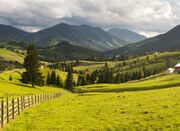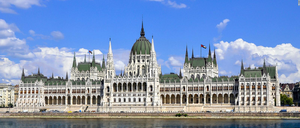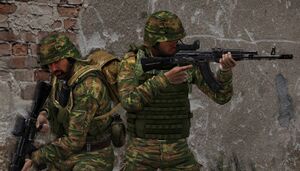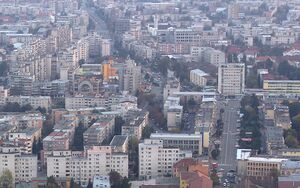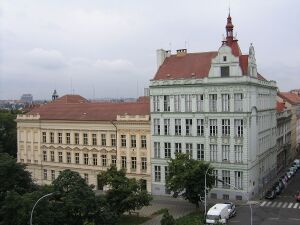Ostrozava
This article is incomplete because it is pending further input from participants, or it is a work-in-progress by one author. Please comment on this article's talk page to share your input, comments and questions. Note: To contribute to this article, you may need to seek help from the author(s) of this page. |
Prime Republic of Ostrozava Ostrozavská Primárská Republika | |
|---|---|
| Motto: "Dělníci se spojují, aby se dařilo!" "Workers, come together to thrive!" | |
| Anthem: "Probuď své bolavé srdce, Ostrozavane!" "Awaken your aching heart, Ostrozavan!" | |
| Capital and largest city | Karsko |
| Official languages | Ostrozavan |
| Recognised regional languages | Liothidian |
| Ethnic groups (2009) | Ostrozavan (85.2%) Liothidian (6.1%) Velik (4.2%) Drev-Nasjzky (3%) Other (1.5%) |
| Religion |
|
| Demonym(s) | Ostrozavan |
| Government | Socialist Federal Constitutional Republic |
• Primar | Dominik Moravec |
• Facilitator | Vincenc Dostál |
• Supreme Justice | Alan Michálek |
| Legislature | People's Congress |
| Population | |
• Estimate | 37,204,940 |
• Census | 2009 |
| GDP (nominal) | 2018 estimate |
• Total | 1,076,896,988,300 |
• Per capita | 28,945.98 |
| Gini (2018) | 36.9 medium |
| HDI (2018) | 0.729 high |
| Currency | Haler (Ͱ) (OZH) |
| Time zone | Belisarian Central Time (+1) |
| Date format | DD/MM/YYYY |
| Driving side | right |
| Calling code | +14 |
| Internet TLD | .oz |
Ostrozava, officially the Prime Republic of Ostrozava (Ostrozavan: Ostrozavská Primárská Republika), is a country in central Belisaria. It is bordered to its west by Liothidia, with which it shares warm relations, and to its east by Velikograd and Drevstran, with which it shares maritime borders. The Prime Republic has a landlocked and hilly landscape that covers an area of X square kilometers (X sq mi), largely situated in the Northern Belisarian Plain, with its borders with Liothidia marked by the medium-height Czelia Mountains. A large part of the nation borders Lake Kupalnitsa, with a mostly temperate continental climate and oceanic climate. It is a federal presidential republic anchored in socialism, with 37.2 million inhabitants. Its capital and largest city is Karsko, with 2.1 million residents; other major cities are Libebor, Jirkov, Táborov, and Orlorec.
Ostrozava is a developed country with an advanced, high income social market economy. Ostrozava is often considered to operate in the political paragdim between a socialist state and a traditional presidential democracy. It is a federal republic and a representative democracy anchored in worker's rights and socialistic principles, although it does not consider itself a socialist state officially; one of the two major politically active parties in Ostrozava is the Socialist Party. It is a welfare state with a Socialist model, universal health care, and tuition-free university education. It ranks as the ninth safest and most peaceful country, though it performs lukewarmly in democratic governance.
The territory of modern Ostrozava was inhabited by the West Gothic people from the 2nd millennium BCE until Slavic colonization in the 3rd century. From the 9th century onward, it was occupied by West Slavic peoples which primarily consolidated in the Grand Duchy of Ostrozava. In 1909, the Revolution of the Bells overthrew the Grand Duchy and established the current Prime Republic of Ostrozava. As a fragile newcomer to the Belisarian political stage, in 1932 Ostrozava attempted to strengthen its political system, introducing Bauerist elements gleaned from its socialist neighbor of Liothidia, which established the two-party paradigm and current constitutional status quo. Since 2008, the state has been governed by the Progressive Party.
Culturally, Ostrozava is considered part of both central and eastern Belisaria. Though primarily a West Slavic country, the nation has sizeable minorities of related groups, including Liothidians, Veliks, and Drev-Nasjzky, as well as some immigrants from Uluujol and Jhengtsang. The official language of the country is Ostrozavan, a language related nominally to Seredinian and Velik dialects; Liothidian is a recognized regional language in the subprime state of Kolava (Liothidian: Ustengard).
History
Prehistory
Archaeologists have found evidence of prehistoric human settlements in the area, dating back to the Paleolithic era. Skulls found in the Great Cave of Vornja have
Grand Duchy
Revolution and Prime Republic
Reform and Integration
Geography
The Ostrozavan landscape is varied. Kolava, to the west, is host to the Czelia mountains, a low mountain range on the border with Liothidia. Its highest peak is Oglav, at 1,511 m (4,957 ft). Litonín, in the central part of the country, is also quite hilly. Ostrozava has two main waterways, both flowing eastward into Lake Kupalnitsa. The first and largest river is the Karmin river, which flows through Karsko. The Karmin also contains the source of the nation's second large waterway, the southeastern-flowing Balrog River.
Phytogeographically, the vast majority of Ostrozava is located inside the phyt Central Belisarian Plain. According to the IBEST Conservational Fund, the territory of the Prime Republic can be subdivided into four ecoregions: the Central Belisarian broadleaf forests, Lake Kupalnitsa grove forests, Velikogradian mixed forests, and Czelian montane conifer forests.
Ostrozava has one of the largest areas of undisturbed forest in Belisaria, covering almost 30% of the territory; recent lumber drives have significantly cut back this number. Some 4,200 plant species have been identified in the country, from which to date 15 have been declared natural monuments, 26 missing, 123 endangered, 340 vulnerable, and 2,150 rare.
Temperate forest in northern Litonín.
Government and politics
The Prime Republic is a unique form of federation, officially describing itself as a "People's Federation", or "Worker's Federation" (Ostrozavan: Dělnická federace). It is a representative democracy, "in which majority rule is tempered by minority rights protected by law". The government is regulated by a system of checks and balances defined by the Ostrozavan Social Contract, which serves as the country's supreme legal document and constitution. For 2018, the P.R.O. ranked 39th on the Democracy Index and 12th on the Corruption Index. In the Ostrozavan socialist-federalist system, citizens are all unilaterally subject to three levels of government: Prime, Subprime, and Local. The local government's duties are typically split between city governments and county governments, with the former holding jurisdiction over urban areas while the latter hold jurisdiction over rural and suburban areas. In almost all cases, executive and legislative officials are elected by a plurality vote of citizens by district; representation at all levels is typically first-past-the-post in nature, though some areas have local variation or proportional representation.
The Prime government comprises three branches:
Legislative: The unicameral People's Congress, headed by the Facilitator, makes federal law, declares war, approves treaties, has the power of the purse, and has the power of impeachment, by which it can remove sitting members of the government. It also has the ability to amend and change the Social Contract.
Executive: The Primar primarily serves to veto legislative bills before they become law, and appoints the members of the Cabinet and other officers, who administer and enforce Prime laws and policies; all of the Primar's decisions are subject to Congressional override. The Executive also serves as the primary facilitator of foreign diplomacy and intelligence.
Judicial: The Supreme Court and lower Prime courts, whose judges are appointed by the People's Congress, interpret laws and overturn those they find unconstitutional; they are considered to have the final say on all matters relating to the Social Contract. They collectively hold jurisdiction over the Ostrozavan Defense Force, though the Prime Commander is self-selected.
The People's Congress has 350 voting members, each representing a congressional district for a two-year term. Congressional seats are apportioned among the subprime voting districts by population every twenty years. The Subprime governments are structured in a roughly similar fashion as the Prime, though the Social Contract allows them leeway in organization. The executive of each state is directly elected, with most consisting of committees instead of individual positions. Most state judges and cabinet officers are appointed by the governors of the respective states, while others are elected by popular vote; many municipal governments, especially those traditionally belonging to the Socialist Party, have organized themselves as Worker Collectives or organized unions.
Law
Ostrozava is a federation with a civil law system based on the continental type, rooted in Liothidian Bauerist and Seredinian legal culture; Ostrozavan law is considered a distinct subset of Belisarian law. The basis of the legal system is the 1985 Legal Amendment to the Ostrozavan Social Contract. The court system includes municipal, subprime and prime courts and is divided into civil, criminal, and administrative branches. The Supreme Court consists of 15 constitutional judges and oversees violations of the Constitution by either the legislature or by the government. It also has jurisdiction over many political matters, such as the formation and closure of political parties, jurisdictional boundaries between government entities, and the eligibility of persons to stand for public office. As the Supreme Court has full jurisdiction over constitutional interpretation, and as such they are considered to have jurisdiction over the Ostrozavan military, which is itself semi-autonomous.
Federal subjects
Internally, the Ostrozavan state is divided into seven constituent republics, established in 1928, and one autonomous area consisting of the federal capital of Karsko. In alphabetical order, these subprime constituencies are:
| Name | Capital | Flag | Coat of Arms | Location |
|---|---|---|---|---|
| Autonomous City of Karsko | Karsko | |||
| Subprime Republic of Litonín | Libebor | |||
| Subprime Republic of Vamo | Táborov | |||
| Subprime Worker's Republic of Kolava | Jirkov | |||
| Subprime Republic of Orlošín | Orlorec | |||
| Subprime Republic of Znomo | Hodobem | |||
| Subprime Republic of Kartov | Balta | |||
| Subprime Socialist Collective of Strakosko | Buděrec |
Foreign relations
Traditionally, Ostrozava has avoided formal alliances that might entail military, political, or direct economic action and has been officially neutral since the creation of the Prime Republic; the Ostrozavan Social Contract outlines a general policy of non-interventionism, though the nation has bent this rule many times in the past. Only in 1990 did Ostrozava become a full member of the Forum of Nations; it was the first state to join it by referendum. In 1995, Karsko became the headquarters of the newly-created Intercontinental Telecommunications Union, a then-controversial move, given the recency of Ostrozava's admission to the organization.
Owing to its ideologically mixed base, Ostrozava has maintained solid diplomatic relations with both socialist and non-Socialist nations since its reconstitution. Socialist or socialist-adjacent nations with close relations to Ostrozava include its western neighbor of Liothidia, with which it shares ethnic and ideological history, and Tsurushima, with which Ostrozava has a special trade partnership. Non-socialist nations of close relation primarily include Belisarian democracies occupying similar ideological space, particularly Seredinia. Though not formally opposed to the Belisarian Community or the prospect of Belisarian monarchy, Ostrozavan foreign policy has been cool to the bloc since its creation. Ostrozava has recently expressed interest in expanding relations with the international socialist community, though it has shied away from endorsing totalitarian states such as Jhengtsang. Ostrozava's neutral stance and position between socialist and non-socialist spheres has led to the nation serving as a diplomatic intermediary between other nations in the past.
Military
The Ostrozavan Defense Force consists of the Ostrozavan Land Forces, the Ostrozavan Air Force, the Ostrozavan Navy, and of specialized support units. The armed forces are managed by the Department of Home Defense. The Prime Commander is the commander-in-chief of the armed forces; he is elected by all active service members every five years. In 2004 the army transformed itself into a fully professional organization and compulsory military service was abolished. Defense spending is approximately 1.19% of the GDP. The Defense Force is charged with protecting the Prime Republic and its allies; since their reconstitution in 1982, they have generally operated with non-interventionist goals.
Economy
In 2018, Ostrozava had a nominal GDP of around $1.08 billion and a GDP per capita of $28,945. According to the Mercantile Society of Sor, Ostrozava is a high income country with an evolving mixed economy. According to the Belisarian Institute of Economics, Ostrozava's GDP per capita was at 64% of the Belisarian average in 2018, an increase from 41% in 2007, making Ostrozava one of the fastest growing economies on the continent.
After 1990 the country experienced a decade of economic instability and decline, led in part by an obsolete industrial base and a lack of structural reform. From 2000 onward, however, the Ostrozavan economy was transformed into one of relative macroeconomic stability, characterized by high growth, low unemployment and declining inflation. According to The World Bank, the GDP per capita purchasing power parity grew from $13,442 in 1990 to an estimated $20,124 in 2010. However, Ostrozava still has one of the lowest net average monthly wages on the continent and an inflation rate of −1.1% as of 2018. Unemployment in Ostrozava was at 8.3% in August 2018, which is fairly high for Belisarian countries.

In 2018, 35.1% of Ostrozavans were employed by state-controlled companies, 55.5% were employed by private companies, and 10.4% were employed by foreign companies, particulary of Seredinian origin. The country relies on its neighbors for various imports, primarily energy imports such as petroleum and natural gas. Important agricultural products include dairy and meat products. The largest local companies include car maker Delia Automotive, Kadlec Electrical, Nováček Telecom, and the Belisarian Worker's Bank. Exports have increased substantially in the past few years, with a 18% annual rise in exports in 2010. Ostrozava's main exports are cars, software, clothing and textiles, industrial machinery, electrical and electronic equipment, metallurgic products, raw materials, pharmaceuticals, fine chemicals, and heavy machinery (especially trains and tramways). Trade is mostly centered on Belisaria, and more particularly Liothidia and Seredinia, with Tsurushima and Pulau Keramat consisting of the most important intercontinental trade partners.
The currency of Ostrozava is the Ostrozavan Haler (Ͱ), which was redominated as a result of inflation in the mid-1980s. Therefore, on 1 January 1985, amid broader economic reforms, 10,000 old Ostrohaler (OZO) became one new Haler (OZͰ). Since then, the currency has been relatively stable, with an exchange rate fluctuating between 3 and 4 Haler for one Liothidian Schilling.
Demographics
According to the 2010 census, Ostrozava's population is 37,204,940. Like other countries in the region, its population is expected to stabilize in the coming years as a result of sub-replacement fertility rates and a neutral net migration rate. In October 2010, Ostrozavans made up 85.2% of the population. The largest ethnic minorities are the Liothidians, 6.1% of the population, and the Velik, 4.0% of the population. Liothidians constitute a near-majority in the Subprime Worker's Republic of Kolava, with Litonín also holding a sizable minority. Other minorities include the Drev-Nasjzky, Tolyks, Zvečajians, Koscians, Siverians, and Tsurushimans. In 1930, there were 745,421 Tolyks in Ostrozava, but only about 72,000 remain today. As of 2009, there were also approximately 434,200 immigrants living in Ostrozava, primarily from Tsurushima and Jhengtsang.
Languages
The official language is Ostrozavan, a West Slavic language, which presents a consistent degree of similarity to Drev-Najisky and Velik dialects, but equally shares many features with Kosican. Ostrozavan is spoken as a first language by approximately 90% of the entire population, while Liothidian and Velik are spoken by 6.2% and 1.2% of the population, respectively. There are also approximately 50,000 native speakers of Tolyk and 32,000 native speakers of Zvečajian living in Ostrozava.
According to the Social Contract, subprime councils ensure linguistic rights to all minorities, with localities with ethnic minorities of over 20%, that minority's language can be used in the public administration, justice system, and education. Foreign citizens and stateless persons that live in Ostrozava have access to justice and education in their own language. Liothidian, Velik, and Anglic are the main foreign languages taught in schools. According to the 2010 census, Liothidian is spoken by 35% of Ostrozavans, while Velik is spoken by 21%.
Religion
Partly as a result of leftist ideological initiatives enacted during the 20th century, Ostrozava is one of the most irreligious nations in the world and the most irreligious nation in Belisaria, with 42.2% of the population declaring themselves as having "No Religion", and 33.8% of the population remaining unaffiliated or undeclared spiritually. The Ostrozavan people have been historically characterized as tolerant and even indifferent towards religion. According to the 2010 census, 13.9% of the Ostrozavan population belong to the Fabrian Catholic church, 9.2% to the Orthodox Christian church, and 0.9% followed other forms of religion both denominational or not (of which 1,063 people answered they are Pagan). Before secularization, Ostrozava's population was split between denominations; many in Ostrozava see growing irreligion as a method of avoiding religious and ethnic conflict.
Education
Education in the Prime Republic is compulsory for 10 years and citizens have access to a tuition-free university education, while the average number of years of education is 13.1; there is a high cultural merit placed on attaining high levels of schooling, leading to a generally higher rate of education especially among the middle class. Additionally, Ostrozava has a relatively equal educational system in comparison with other countries in Belisaraia. Founded in 1458, the University of Litonín was the second university in Central Belisaria. Other major universities in the country are Panek University, Ostrozavan Worker's University, Karsko University, and the Ostrozavan Academy of Humanities. The International Bureau of Education, Science, and Traditions, coordinated by the Forum of Nations, currently ranks the Ostrozavan education system as the 15th most successful in the world, higher than the FoN average.
Healthcare
Healthcare in Ostrozava is similar in quality to other Belisarian nations on a social model. The Ostrozavan universal health care system is based on a compulsory insurance model, with fee-for-service care funded by mandatory employment-related insurance plans; until 1985, Ostrozava operated on a single-payer system before all healthcare was fully nationalized. According to the 2016 WOHD Report, the Ostrozavan healthcare is 18th, ranked behind Latium and two positions ahead of Belfras. The most common causes of death are cardiovascular diseases and cancer. Ostrozava has been increasingly affected by a mental health epidemic since the mid-90s; rates of depression have skyrocketed. As a result, Ostrozava is now considered to have one of the best mental healthcare systems in the world.



